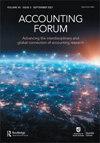Social and environmental accounting research in vulnerable and exploitable less-developed countries: a theoretical extension
IF 3.4
4区 管理学
Q2 BUSINESS, FINANCE
引用次数: 5
Abstract
ABSTRACT Research on social and environmental accountability (SEA) and transparency in less-developed countries may generate deeper insights, if theoretical underpinnings which are consistent with the social, political and economic realities found in these countries are used. This paper revisits “vulnerability and exploitability” framework introduced by [Belal, A. R., Cooper, S. M., & Roberts, R. W. (2013). Vulnerable and exploitable: The need for organisational accountability and transparency in emerging and less developed economies. Accounting Forum, 37(2), 81–91]. The paper refines, builds on and extends the theoretical context of the framework with a view to strengthening its ability to describe, explain and predict corporate SEA and transparency practices in less-developed countries. The study utilises analytical review of the relevant multidisciplinary literature from environmental economics, vulnerability and openness, and SEA in less-developed countries. In doing this, firstly, the paper derives three postulates and presents a diagram depicting the conditions which make less-developed countries vulnerable and exploitable. Secondly, as the main contribution of the study, pollution haven theory is integrated into the framework as an additional element. This leads to the derivation of five additional postulates and a modified diagram depicting the conditions for pollution haven and the outcomes of vulnerability’s causal link with exploitability and pollution haven. These outcomes take the form of poor SEA and transparency indicated by low corporate social and environmental performance, disclosure level and disclosure quality. The postulates developed are put forward for further debate and empirical tests.脆弱和可剥削的欠发达国家的社会和环境会计研究:一个理论延伸
如果使用与欠发达国家的社会、政治和经济现实相一致的理论基础,对欠发达国家的社会和环境问责制(SEA)和透明度的研究可能会产生更深入的见解。本文回顾了由[Belal, a.r., Cooper, s.m., & Roberts, r.w.(2013)]引入的“漏洞和可利用性”框架。脆弱和被剥削:新兴和欠发达经济体对组织问责制和透明度的需求。会计学刊,37(2),81-91。本文完善、建立和扩展了该框架的理论背景,以加强其描述、解释和预测欠发达国家企业环境评估和透明度实践的能力。该研究利用了对环境经济学、脆弱性和开放性以及欠发达国家环境影响评估等相关多学科文献的分析综述。在此过程中,本文首先推导出三个假设,并提出了一个图表,描绘了使欠发达国家脆弱和可剥削的条件。其次,作为研究的主要贡献,污染港理论作为附加元素被纳入框架。这导致推导出五个额外的假设和一个修改的图表,描绘了污染避难所的条件以及脆弱性与可利用性和污染避难所的因果关系的结果。这些结果表现为不良的SEA和透明度,表现为企业社会和环境绩效、披露水平和披露质量较低。提出的假设是为了进一步的辩论和实证检验。
本文章由计算机程序翻译,如有差异,请以英文原文为准。
求助全文
约1分钟内获得全文
求助全文
来源期刊

Accounting Forum
BUSINESS, FINANCE-
CiteScore
5.20
自引率
6.50%
发文量
0
期刊介绍:
Accounting Forum publishes authoritative yet accessible articles which advance our knowledge of theory and practice in all areas of accounting, business finance and related subjects. The journal both promotes greater understanding of the role of business in the global environment, and provides a forum for the intellectual exchange of academic research in business fields, particularly in the accounting profession. Covering a range of topical issues in accounting, business finance and related fields, Accounting Forum''s main areas of interest are: accounting theory; auditing; financial accounting; finance and accounting education; management accounting; small business; social and environmental accounting; and taxation. Of equal interest to practitioners, academics, and students, each issue of the journal includes peer-reviewed articles, notes and comments section.
 求助内容:
求助内容: 应助结果提醒方式:
应助结果提醒方式:


